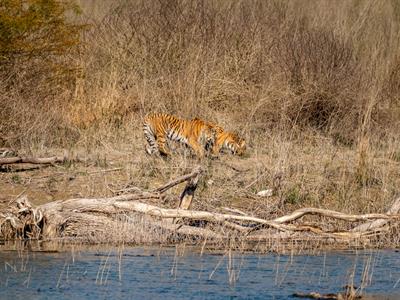
PUMPA - SMART LEARNING
எங்கள் ஆசிரியர்களுடன் 1-ஆன்-1 ஆலோசனை நேரத்தைப் பெறுங்கள். டாப்பர் ஆவதற்கு நாங்கள் பயிற்சி அளிப்போம்
Book Free DemoHe should be lurking in shadow,
Sliding through long grass
Near the water hole
Where plump deer pass.
He should be snarling around houses
At the jungle’s edge,
Baring his white fangs, his claws,
Terrorising the village!
Explanation:
Every creature born in this world has a purpose of its own and certain characteristics that they follow. Some are born meek, whereas some are born to hunt and prey. In the ecosystem, every individual/creature survive according to the food chain hierarchy. The tiger, by nature, is a wild animal that is made to prey on other smaller animals and live in a particular way. But being caged has disrupted the entire flow of his life. The poet sums up the list of things that the tiger would have done if at all it was free.
The second stanza lists out the fact about the possible things or the events that could have unfolded with respect to preying. The tiger would have easily been lurking behind shadows. Wild animals have a particular pattern of hunting. The initial step is that they do not reveal themselves in the light. They are mostly found near water bodies, as every animal in the jungle has to quench its thirst and comes near a lake or river to drink water. Animals like deer, which are not carnivorous, would roam around near the water bodies in search of reeds as well. But they can be very swift, and once they sense the slightest danger, they would flee. For this reason, the tiger lurks in the shadows of great trees, waiting for the opportunity. They slide as smooth as slime amidst the grass blades and, when the deer does not suspect at all, pounces on it. The tiger whose place should have been near the water hole is now in the cage.

Tiger eyeing its prey near water hole
People build their houses and other dwelling areas by cutting across jungles. Now, these forests are home to thousands of animals. But humans make them flee from their own homes, thereby getting comfortable. The animals, therefore, have no place to go and therefore intrude the human space. Rather than understanding the situation, they stone and shoo away any animal that they come across in the vicinity. The tiger is a royal animal, and therefore, if he were free, he would have been snarling around the neighbourhood. He would go to the people who have built houses at the edge of the jungle and scare him by showing them his white fangs and claws. This shows that the tiger is an animal to be clearly scared of, which is probably one of the reasons that he is caged.
Meaning of difficult words:
| S.No | Words | Meaning |
1 | Lurking | Waiting unknowingly |
2 | Sliding | To creep slowly |
3 | Plump | Very fact and juicy |
4 | Snarling | Make an aggressive growl |
5 | Jungle | Thick forest |
6 | Fangs | A large sharp tooth of an animal |
7 | Claws | A curved pointed nail at the end of an animal's foot |
8 | Terrorizing | To create fear |
9 | Carnivorous | Eating meat |
Reference:
National Council of Educational Research and Training (2006). Beehive. A Tiger in the Zoo - Leslie Norris (pp. 29-31). Published at the Publication Division by the Secretary, National Council of Educational Research and Training, Sri Aurobindo Marg, New Delhi.